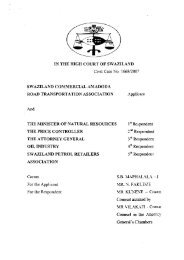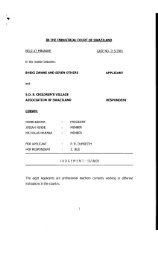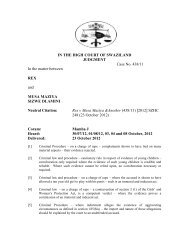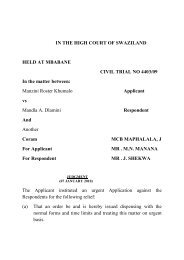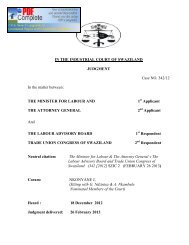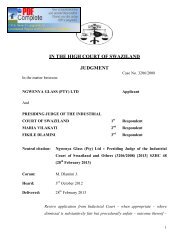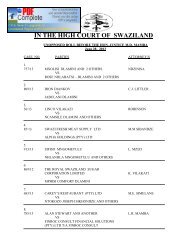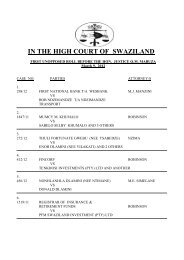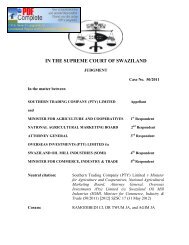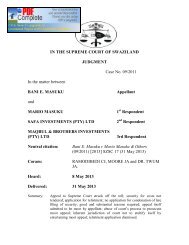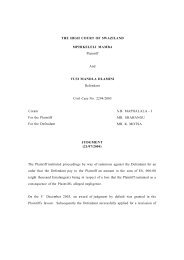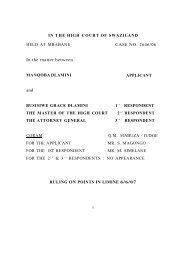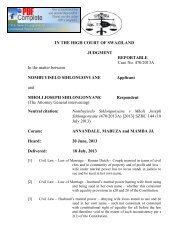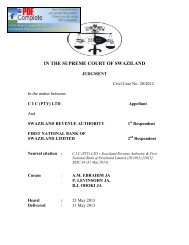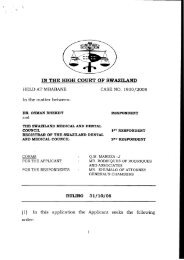IN THE HIGH COURT OF SWAZILAND - SwaziLII
IN THE HIGH COURT OF SWAZILAND - SwaziLII
IN THE HIGH COURT OF SWAZILAND - SwaziLII
Create successful ePaper yourself
Turn your PDF publications into a flip-book with our unique Google optimized e-Paper software.
t 'tC<br />
<strong>IN</strong> <strong>THE</strong> <strong>HIGH</strong> <strong>COURT</strong> <strong>OF</strong> <strong>SWAZILAND</strong><br />
HELD AT MBABANE CASE NO. 2717/07<br />
In the matter between:<br />
WlZ TECH <strong>IN</strong>VESTMENTS (PTY) LTD APPLICANT<br />
AND<br />
IAN NXUMALOt/a WlZ TECH<br />
GENERATIONS<br />
CORAM<br />
FOR APPLICANT<br />
FOR RESPONDENT<br />
JUDGEMENT<br />
MAMBAJ<br />
9TH NOVEMBER, 2007<br />
RESPONDENT<br />
MR NGCAMPHALALA<br />
MRMABUZA<br />
[lJ The apparent applicant is a company duly registered in<br />
terms of the company laws of Swaziland and has its principal<br />
place of business at Shop No. A2, Apex House, Sheffield Road<br />
in Mbabane. It claims it is the sole distributor and or seller of<br />
Wiz Tech Satellite Decoders and receivers and accessories<br />
thereto in Swaziland.<br />
1
, . , , '<br />
[2J The respondent is Ian Nxumalo. He is described as an<br />
adult male business operator trading as Wiz Tech Generations<br />
and has his principal place of business at office No.1 Manzini<br />
Heights in Manzini.<br />
[3J The applicant was established in or about January 2007.<br />
[4 J The respondent started his business operations four<br />
months later in the same line of goods sold by the applicant.<br />
He also claims that he holds the sole dealership license in the<br />
products he sells. Both parties derive their names from the<br />
Wiz Tech products they claim to sell. As a result of the use of<br />
the trading name by the respondent, the applicant complains<br />
that the respondent has stolen its name, clientele or business<br />
and income. The applicant has thus applied for an interdict<br />
restraining and prohibiting the respondent from:<br />
"(i) ... using, adopting or imitating applicant's trade name<br />
or get-up of applicant's products.<br />
(ii) ... passing-off his goods as those of the applicant or as<br />
being connected in the course of trade with the applicant<br />
by using in regard thereto an "offending get-up" or any<br />
get-up which is confusingly or deceptively similar to<br />
applicant's distinctive get-up."<br />
2
, .'<br />
[5] The application has been filed or launched by Nkosinathi<br />
Nhlamba Jabulani Ndlovu, (hereinafter referred to as Mr<br />
Ndlovu) one of the Directors of the Applicant. He claims in the<br />
founding affidavit (in support of the application) that he is ...<br />
duly authorized to make this affidavit." One immediately<br />
notes that Mr Ndlovu does not say that he is authorized or<br />
empowered to bring this application on behalf of or in the<br />
name of the applicant.<br />
[6] In his opposing affidavit, the respondent has inter alia<br />
denied that Mr Ndlovu is a Director of the applicant or that he<br />
is authorized to bring this application on behalf of the<br />
applicant. In response to the first point herein, Mr Ndlovu has<br />
in his replying affidavit filed a form J which is a copy of the<br />
applicant's register of Directors filed with the Registrar of<br />
Companies. It bears the said registrar'S date stamp for the<br />
12 th day of January 2007 and Mr Ndlovu is listed as one of the<br />
directors of the applicant. This information, in my view,<br />
disposes of that objection, at least for purposes of this<br />
application. Mr Ndlovu is prima facie a Director of the<br />
applicant.<br />
[7] The mere fact that Mr Ndlovu is a director of the Applicant<br />
does not, however, cloth him with the necessary authority or<br />
mandate to bring this application on behalf of the applicant.<br />
3
· "<br />
[8] As an artificial person, a company litigates or carries out its<br />
business operations through its Directors and other servants.<br />
These servants or Directors must be duly authorized to do<br />
whatever they do on behalf of the company. It would, for<br />
instance, be chaotic (for a company) if any of its many<br />
Directors were to, and at any time, and without authorization<br />
file a suit on behalf of the company whenever such Director<br />
thought the company had a legitimate grievance to bring<br />
before the court. This would lead to unbridled actions being<br />
filed on behalf of the Company.<br />
[9] In casu, Mr Ndlovu does not address the issue of his<br />
authority to bring this application. He is happy just to allege<br />
and prove that he is a director of the applicant. That is,<br />
however, not enough. The fact that he has not seen it fit for<br />
him to address this point head-on, seems to indicate to me<br />
that the company directors did not authorize him to file this<br />
application. The onus to establish that the application has<br />
been duly authorized rests on Mr Ndlovu herein.<br />
[10] In the case of Mall (Cape) (Pty) Ltd v Merino Ko-operasie<br />
BPK. 1957 (2) SA 347 at 351-352 Watermeyer J, writing for<br />
the Court stated the position in the following terms;<br />
"I proceed now to consider the case of an artificial<br />
person, like a company or cooperative society. In such a<br />
case there is judicial precedent for holding that objection<br />
4
the other cases mentioned .... This seems to me to be a<br />
salutary rule and one which should apply also to notice<br />
of motion proceedings where the applicant is an artificial<br />
person. In such cases some evidence should be placed<br />
before the court to show that the applicant has duly<br />
resolved to institute the proceedings and that the<br />
proceedings are instituted at its instance. Unlike the<br />
case of an individual, the mere signature of the notice of<br />
motion by an attorney and the fact that the proceedings<br />
purport to be brought in the name of the applicant are in<br />
my view insufficient. The best evidence that the<br />
proceedings have been properly authorized would be<br />
provided by an affidavit by an official of the company<br />
annexing a copy of the resolution but I do not consider<br />
that that form of proof is necessary in every case. Each<br />
case must be considered on its own merits and the court<br />
must decide whether enough has been placed before it to<br />
warrant the conclusion that it is the applicant which is<br />
litigating and not some unauthorized person on its<br />
behalf. Where, as in the present case, the respondent<br />
has offered no evidence at all to suggest that the<br />
applicant is not properly before the court then I consider<br />
that a minimum of evidence will be required from the<br />
app 1· lcant .... "<br />
6
[11] And in Pretoria City Council v Meerlust Investments Ltd,<br />
1962 (ll SA 321 (AD) at 325 Ogilvie Thompson JA stated as<br />
follows;<br />
"The question of authority having been raised, the onus<br />
is on the petitioner to show that the prosecution of the<br />
appeal in this court has been duly authorized by the<br />
council; that it is the Council which is prosecuting the<br />
appeal, and not some unauthorized person on its<br />
behalf .... As was pointed out in that case, SInce an<br />
artificial person, unlike an individual, can only function<br />
through its agents, and can only take decisions by the<br />
passing of resolutions in the manner prescribed by its<br />
constitution, less reason exists to assume, from the mere<br />
fact that proceedings have been brought in its name, that<br />
those proceedings have in fact been authorized by the<br />
artificial person concerned. In order to discharge the<br />
above mentioned onus, the petitioner ought to have<br />
placed before this court an appropriately worded<br />
resolution of the council."<br />
[12] The above two cases were quoted with approval by<br />
Corbbet J (as he then was) in Griffiths and Inglis v Southern<br />
Cape Blasters (pty) Ltd, 1972 (4) SA 249 (C).<br />
[13] In the result, the objection in limine must be upheld and<br />
the application is dismissed with costs. Having found that Mr<br />
7
Ndlovu was acting on a frolic of his own in prosecuting this<br />
application, it is only logical, I think, that he should bear the<br />
costs of suit and it is so ordered.<br />
[14] As a result of this conclusion, it is not necessary for me to<br />
deal with or consider the other points raised in this<br />
application.<br />
8



